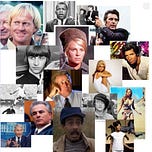It is September 26, 1960.
Richard Nixon and John F. Kennedy are in a Chicago television studio for their first presidential debate.
The moderator, Howard K. Smith, sits at a desk separating the two candidates.

More than sixty-six million people are watching on TV.
And millions more are listening on radio.

Most of the people watching on TV will give Kennedy the win.
Events leading up to the debate made a difference in the candidates’ performance.

Nixon had just been released from a two-week hospital stay for a knee injury.
And he bumped that knee, reinjuring it, when he got out of the car that night.
Kennedy had worked up a tan out on the campaign trail.
He sunned himself on his hotel rooftop that afternoon, then took a long nap.

Both men turned down studio makeup, but Kennedy had his staff apply some in secret just before airtime.
Nixon applied “Lazy Shave” to cover a five o’clock shadow, but it started to run down his face during the broadcast.

Then there was the matter of clothing choice.
Kennedy’s suit was navy blue.
And Nixon’s was light gray — the same color as the studio set background.

Also important: who did the candidates listen to for debate advice?
Kennedy’s brother, Bobby, had told him to ‘kick Nixon in the balls.’

Nixon’s running mate, Henry Cabot Lodge, had told Nixon to ‘erase your assassin image.’

Journalists’ questions were limited to domestic issues and both men revealed a command of the issues.
Kennedy, heeding Bobby’s advice, came off strong and aggressive.
Nixon, licking his lips and moping his face with his handkerchief, but heeding Lodge’s advice, sounded passive and conciliatory.

And both of the men’s running mates were unhappy with the result.
Lodge said, ‘That son-of-a-bitch just lost us the election.’

Kennedy’s running mate, Lyndon Johnson, who had listened on the radio, thought Kennedy had lost the debate.
The moderator, Howard K. Smith, who could only see the candidates’ backs during the debate, initially gave the win to Nixon.
But he changed his mind after viewing a replay, saying later, ‘I could see that Kennedy swept it. He just looked so enchanting.’

The polls were tight before the debate, and they remained tight afterwards.
But Kennedy pulled out a win in November by a minuscule popular vote margin.

While some scholars have discredited the view that the televised debates gave Kennedy the victory, Kennedy thought they mattered.
After the election, he said ‘it was the TV more than anything else that turned the tide.’
And he was probably right.

There were no presidential debates for the next sixteen years.
******************************
I’ll see you tomorrow.
— Brenda














Share this post